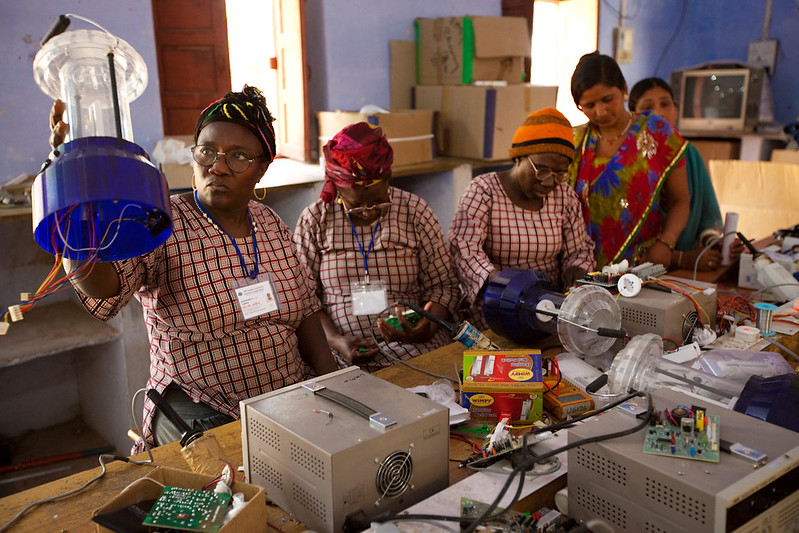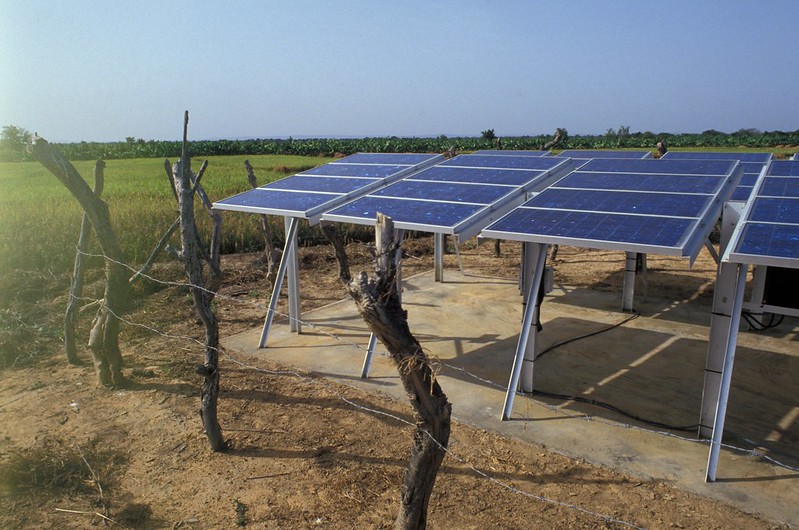CAS2021: Accelerating climate-resilient economies in Africa
CAS2021: Accelerating climate-resilient economies in Africa
There was a clear call for Africa to forge a new path towards climate-resilient development at the Africa anchoring event of the Climate Adaptation Summit - seizing the opportunities of green technologies and jobs.
The Africa event was a two-hour session focused on how to accelerate adaptation action on the continent, as part of a 24-hour global, online summit, which attracted some 18,000 registrations. Lisa McNamara of CDKN reports.
New pathways to growth
African leaders and development partners at the CAS Africa anchoring event were unanimous in agreeing that climate change – and now the additional stress of the Covid-19 pandemic – is a momentous threat to Africa’s economic growth and development prospects. President Ali Bongo Ondimba of Gabon remarked at the Summit’s opening session that “today the Covid crisis is eroding our development gains and adding fuel to our climate crisis. Still, Africa has no choice but to adapt.”
While there was general consensus of the threats, contributors also highlighted the significant opportunities in a greener, more resilient, development path: “Africa does not need to follow the old models of industrialisation. Africa can chart a new course” said Dr. Hafez Ghanem, Vice President Eastern and Southern Africa for the World Bank. And the African Green Stimulus Plan agreed in December 2020 by African ministers of environment, consolidates green economy and climate change initiatives in Africa and provides a bold plan for an economic transition in our new Covid-19 reality.
Job creation remains a key priority for Africa, particularly given Africa’s increasingly youthful population (read a separate CDKN blog on the youth theme at CAS2021). The public and private sectors need to join forces to find ways of absorbing more and more young people into the predominantly informal job market every year. “We need a coalition of public and private actors”, Lesley Ndlovu, CEO of Africa Risk Capacity, told the Summit.
The world of work is also rapidly changing. Investing in innovation, research and development, and entrepreneurship is going to become ever more critical in this rapidly-evolving global context, highlighted World Bank President David Malpass at the Summit’s opening: “Many of the jobs of the future don’t yet exist.”
There are promising signs that the private sector is starting to embrace green technologies: from solar-powered irrigation systems for small holder farmers to clean cooking fuel for Nairobi residents. Other breathtakingly large projects being implemented across the continent also show some promise for creating green jobs and enterprises. The Great Green Wall land restoration project in the Sahel aims to create 10 million productive jobs. And the new joint African Development Bank (AfDB) and Global Commission on Adaptation (GCA) Adaptation Acceleration programme, launched at the Summit, aims to support 10 000 youth-led Small, Medium and Micro-enterprises (SMMEs).
Read more CDKN reporting on the Africa anchoring event on these topics, including private sector innovation: Africa adaptation event shines spotlight on climate-smart agriculture.
Adaptation makes economic sense
The GCA calculated that adaptation actions, such as an early warning system or climate-proofed infrastructure, can have a cost-benefit ratio of one to five or even as much as one to ten (every one dollar spent saves five to ten dollars). “We know adaptation simply makes good economic sense. I am an economist by background, I wish my portfolio looked like the rate of return that adaptation yields”, emphasised Kitty van der Heijden, Director General for International Cooperation at the Netherlands Ministry of Foreign Affairs. Making this “business case” to the private sector is central to unlocking private sector investment in adaptation at scale, said Lesley Ndlovu.
In his launch of the Summit, The Netherlands Prime Minister Mark Rutte highlighted that US$1.8 trillion invested in climate change adaptation in the next decade could deliver US$7.1 trillion in net benefits. "Not only is it the right thing to do, it is the smart thing to do.”
And it seems that global financial actors agree. Kristalina Georgieva from the International Monetary Fund said earlier that: “Our research shows that if we combine rising carbon prices with green infrastructure to bring emissions down, and adapt, we can boost GDP by 0.7% higher growth and we will create millions of green jobs.”
“Business-unusual” planning approach and long-term view is needed
A number of African countries are showing that pursuing a climate-resilient development pathway requires an alternative planning approach; it is simply not enough to implement isolated adaptation projects, or involve a few climate-related sectors and ministries.
At the Africa event, Rwanda, Kenya and Ethiopia shared their efforts to integrate climate change adaptation into their countries’ main planning instruments: national development plans. Gebru Jember Endalew, LDC Elder, shared Ethiopia’s planning journey to a more holistic “sector-wide” planning process: “We started with a projectised approach and realised it was not sustainable, so mainstreamed climate into our development plans… You need to have a business-unusual planning approach.”
Planning for climate change has also meant that Ethiopia is slowly shifting its planning to become more long term: “We used to plan one to two years ahead and now we are really able to plan for the medium and long term.” Ethiopia is also now moving towards reflecting on their planning experiences: “We realised we were good at doing, but not good in documenting – and we now focus too on learning.”
Kristalina Georgieva also asserted that mainstreaming climate into macroeconomic data is also crucial. In 2021 the IMF will launch a climate change dashboard to track the economic impact of climate risks and mitigation measures.
Summit contributors agreed unanimously that robust partnerships across government and society are a key enabler in the shift towards more cross-sector approaches, where adaptation is everyone’s business. “Promotion of the climate-resilient development pathway, requires a multilateral approach and strong partnerships”, said Josefa Sacko of the African Union Commissioner for Rural Economy and Agriculture.
Financing the transition
Much still needs to be done to help African countries finance this fundamental restructuring of their economies. “Most donor countries have been reluctant to fund prevention. A new mindset is urgently needed: Adaptation is the biggest prevention ticket in town”, said Minister Kaag, Netherlands’ Minister for Foreign Trade and Development Cooperation.
Dr. Yannick Glemarec reminded the Summit that the Green Climate Fund is investing in integrated planning and policy development. Meanwhile, the African Development Bank has committed to mobilise $25 billion in climate finance between 2020 and 2025, of which at least 50% will support climate adaptation and resilience building. AfdB and the GCA will use this to leverage an additional $12.5 billion through other key partners.
There are a number of other new or existing global initiatives specifically supporting climate-resilient investment, part of the Adaptation Action Agenda, which will guide the Decade of Action towards 2030 launched at the Summit. This includes the newly-created, private sector‐led Coalition for Climate Resilient Investment (CCRI), and the Adaptation Finance Mainstreaming Program to support the work on macro, fiscal, budget, and procurement policies required to manage climate risk.
We cannot afford to fail
This growing momentum for the adaptation agenda is a step in the right direction. At the Africa event, there was a palpable sense of optimism in the virtual room about the possibility of a greener and more prosperous Africa. There was also a deep sense of the urgency given the potentially catastrophic impacts for millions of African people should we fail: “We have nine years to do it – that is not a long time to transform your economy”, said Ms. van der Heijden. “Let’s turn words into action, hope into reality, promises into financing for Africa”, urged Dr. Akinwumi Adesina, President of the African Development Bank.
Read further insights on boosting climate resilient development in African in CDKN’s working paper ‘Accelerating adaptation action in Africa: Insights from African experts.’
Images: top, right (President Kagame of Rwanda, May 2020) - credit Paul Kagame; above, top (African solar power technicians in training) - credit United Nations Women; above, bottom (solar power on Malian farm) - credit World Bank.


